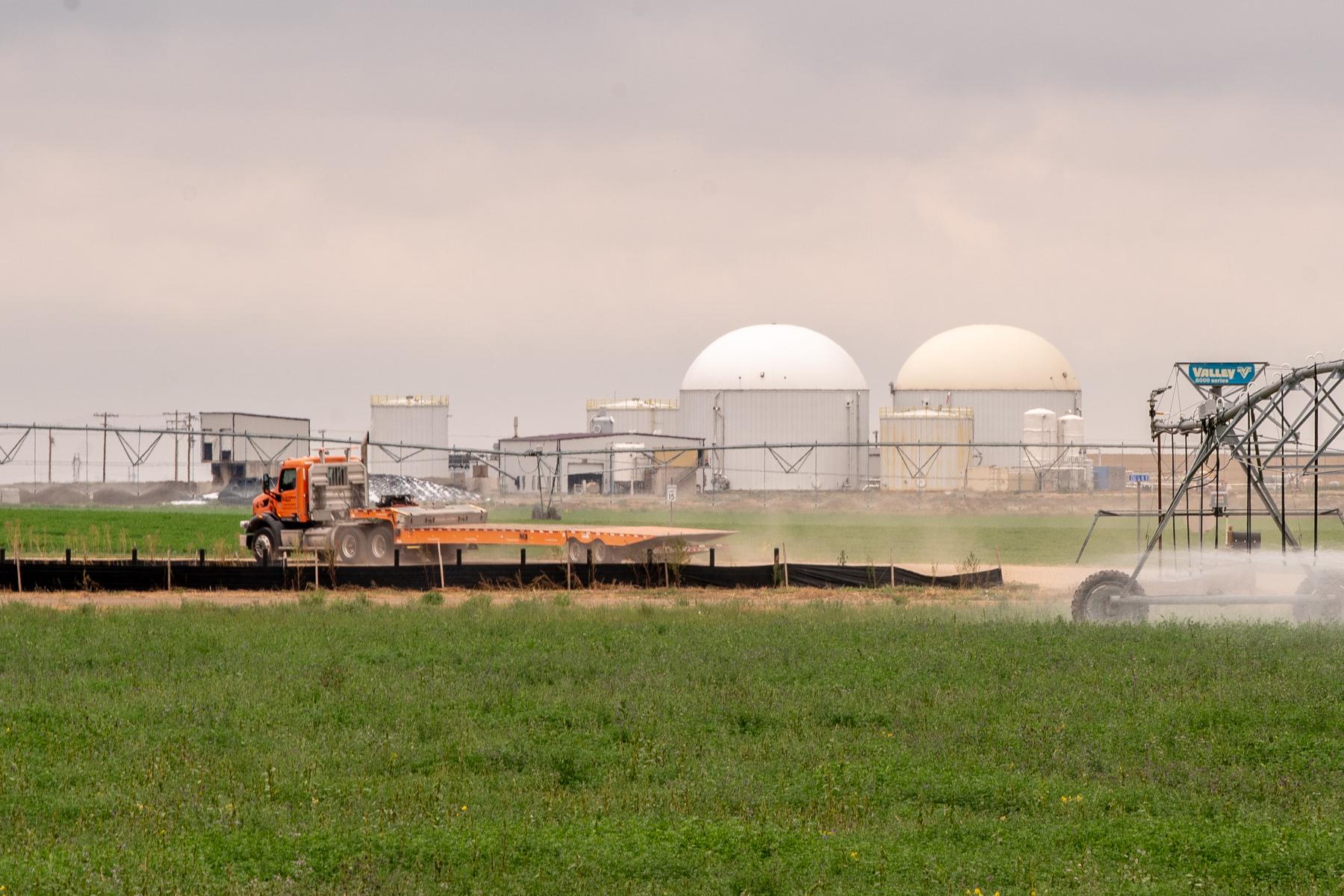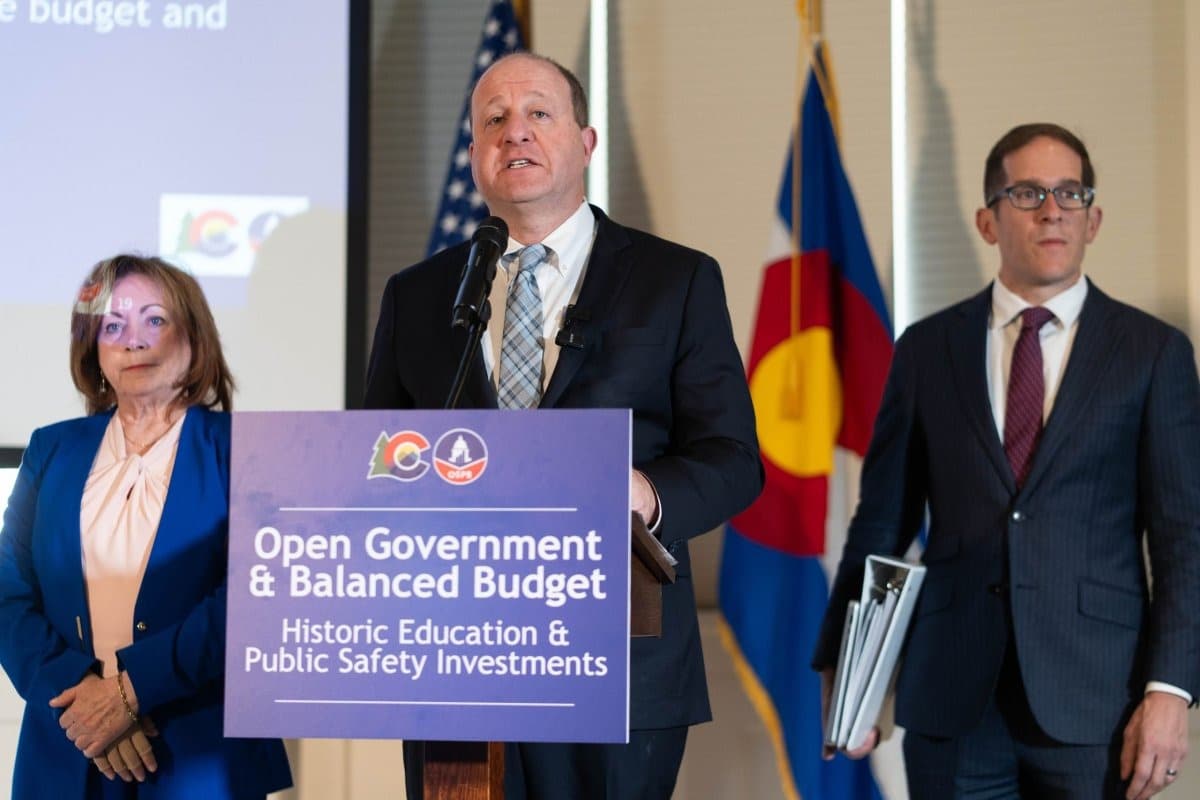
Democratic U.S. Rep. Ed Perlmutter predicted Tuesday the U.S. Space Command headquarters will stay in Colorado.
Peterson Air Force Base in Colorado Springs now serves as the command’s temporary headquarters and is expected to keep that status for the next few years.
But in the late days of the Trump presidency, administration officials issued a surprise order to put the command’s permanent headquarters in Huntsville, Ala. On Tuesday, Perlmutter joined the rest of the state’s congressional delegation in a letter urging the Biden administration to suspend the decision until there’s a full review.
Perlmutter represents several of Denver’s northwest suburbs, including some major space contractors. He told Colorado Matters he expects Biden will ultimately overturn Trump’s call.
“I think we will be able to reverse that decision,” he said. “Colorado by any measure was the number one choice for the Air Force for a lot of different reasons — all of the assets we have here in terms of our education system, the number of different contractors that we have here, plus our defense posture that we have especially in Colorado Springs.”
In the meantime, though, the Biden administration’s top priority is the approval of a $1.9 trillion pandemic recovery plan that includes a ramp-up of COVID-19 testing and vaccinations along with an economic stimulus package. Perlmutter said Congress needs to act quickly, despite calls for changes to the plan.
Critics argue that Biden’s proposal for a $1,400 per person direct stimulus payment is too broad and should be recast to target those most in need. Perlmutter said he’s willing to consider changes — but not if it means delaying the package.
“Right now there are income brackets who get the $1,400. It doesn’t go to everyone, it’s based on income and things like that,” Perlmutter said. “It could be refined more but I’m with the president on this, President Biden is prepared to refine it but he wants to get those checks out the door because people need it and the economy needs it.”
Interview Highlights
On how Colorado would benefit from a Biden infrastructure proposal:
“Obviously our roads and our bridges need a lot of work, we have for years been trying to come up with some state initiative to help us there but we definitely need a lot of work on our roads and bridges. It will help us expand our broadband. And we're seeing that a number of our cities and communities have aging water systems that all need some help. So, good projects that will be excellent into the future but are good jobs today.”
On Biden’s proposal to raise the federal minimum wage to $15 an hour:
Colorado’s 2021 minimum wage is $12.32 an hour.
“I’d like to see the minimum wage raised. Colorado has kind of done this step program so that it goes up gradually over time. And again, that's something that could be refined. Some places, whether you're Seattle or maybe New York City or San Francisco, a $15 wage means one thing, if you're in rural Colorado, it means something else. So if we can, in a quick moment, come up with a way to refine it I’m prepared to do that. But again, I don't want to hold up this big economic package, the COVID package, to refine just to perfection. People need the help. Now.”
On what he hears from constituents about the partisan divide:
“What I do hear is that people have concerns about the divide. I think part of what has to be done is as an elected leader, and just people generally, need to tone down the rhetoric, not use exaggerations and hyperbole all the time and listen to each other. I hope to do that as a normal part of being a leader in Congress or a leader in the state, but I'm also going to be more careful with my words.”
On his hopes for the U.S. space program:
Perlmutter backs a goal to get humans to Mars by 2033. The Trump administration pushed for that idea, but the Biden administration is seen as less enthusiastic.
“From the Congress' standpoint I think we're going to continue to push forward on getting back to the moon and then on to Mars … I have my 2033 bumper sticker where I would like our astronauts to get to Mars by 2033 when the orbits are closest for a long time. It is safer and saves a lot of space travel.
But I think this administration will work with Congress to make sure that we continue our human space flight efforts and our exploration and we're not going to do it at the expense of Earth science or planetary or solar science. We can do all these things and I will continue to be a real advocate for our continued efforts to get back to the moon and then on to Mars.”
Interview Transcript
AD: This is Colorado Matters from CPR News and KRCC, I'm Andrea Dukakis. The impeachment of former President Donald Trump has now moved to the Senate, leaving House members to tackle President Joe Biden's priority, a big COVID-19 recovery package. For more about that and other issues facing the new Congress, I'm joined by Democratic Representative Ed Perlmutter. His district includes many of Denver's western and northern suburbs. Representative, welcome.
Rep. Ed Perlmutter: Good morning Andrea.
AD: Let's start with the president's proposed direct stimulus payment of $1,400 per person. There's been some talk about refining that. It would be directing the money to lower-income people, those most in need, rather than giving that amount to everyone. What are your thoughts on that?
EP: Well, if we can refine it and do it properly, so that these pandemic payments get out quickly, then okay. But right now there are income brackets who get this $1,400. It doesn't go to everyone, and it's based on income and things like that. It could be refined more, but I'm with the president on this. President Biden is prepared to refine it but he wants to get these checks out the door because people need it and the economy needs it.
AD: Another element of the president's plan is raising the federal minimum wage to $15. The Colorado minimum wage is now $12.32. Obviously in an economic crisis a lot of workers need higher paying jobs to meet their expenses, but this would also raise costs for lots of small businesses, many are struggling right now to keep their doors open. Where do you fall on that particular part of the plan?
EP: Well, I'd like to see the minimum wage raised. Colorado has done this step program so that it goes up gradually over time. Again, that's something that could be refined. Some places, whether you're Seattle or maybe New York City or San Francisco, a $15 wage means one thing, if you're in rural Colorado it means something else. If we can in a quick moment come up with a way to refine it I'm prepared to do that. But again, I don't want to hold up this big economic package, the COVID package, to refine just to perfection. People need the help now.
AD: Is there another element of the Biden plan you think will be particularly helpful to people here in Colorado?
EP: I think that part of the plan (that is) getting vaccines to people in mass quantities. We know in Colorado and elsewhere across the country that there just hasn't been a good distribution plan, there hasn't been enough vaccine made available. Once we get people vaccinated and the virus starts to subside, we're also going to see the economy take off. I think that the president and his efforts, and he's done a lot in the last couple days on the coronavirus, to really make sure we develop and distribute as much vaccine as possible, treat people with as many possible treatments as possible to get this virus behind us.
AD: We'll talk more about vaccines in a moment, but is there part of the recovery proposal as it's written now that you don't support?
EP: No, I like his proposal. The biggest part, I didn't talk about it is infrastructure, and we certainly need a big infrastructure package for this country. It's been talked about for some time, but under the Trump administration we really didn't do the kind of infrastructure that's needed to keep our country competitive. When we're building roads and bridges and we're rebuilding our waterworks and adding broadband and working on our electrical grid, as well as housing and schools, that's going to put a lot of people to work too. One, it'll make us competitive with the rest of the world for the next 50 years, and it will put a lot of people to work right now.
AD: What will that mean for Colorado in particular?
EP: So Colorado obviously our roads and our bridges need a lot of work. We have for years been trying to come up with some state initiative to help us there, but we definitely need a lot of work on our roads and bridges. It will help us expand our broadband. We're seeing that a number of our cities and communities have aging water systems that all need some help. Good projects that will be excellent into the future but are good jobs today.
AD: A lot of people are worried about what this level of federal spending will mean for the economy and whether it will hurt it in the long run. Others say, ‘No, we need to spend right now.’ What are your thoughts?
EP: My thoughts are we need the infrastructure now, and we need to get this virus behind us now. We'll eventually have to pay this back in some way, but we will have a competitive and a strong economy and a healthy population to do it. I think if we continue to wait we're going to see our economy continue to shrink, and we're going to see our deaths continue to rise, and we've got to stop both of those things. I appreciate the folks that want to tighten the belt, which they didn't want to do under Trump, but now they want to do it under Biden, but we need to get infrastructure built and we need to get the virus under control.
AD: What about the next generation though? What are they going to have to deal with, with all this money that we're spending right now?
EP: Well, the next generation will have different problems to confront. The costs that we have to incur now are something that they may have to pay, but we want to make sure that they have a healthy and strong population and a strong economy. That will be most of the battle for them. Over time, it will get paid. This country has a lot of assets. When we look at all the assets that we have, especially us as Americans, as people, that's our greatest asset. If we are healthy and we have jobs, the future will take care of itself and future generations will thank us.
AD: You announced last November that you had COVID. Is there anything in your personal experience with the virus that might influence your view on how President Biden should handle the pandemic?
EP: Thanks for that question Andrea. I can tell you if you have a choice between the virus and a vaccine, take the vaccine every time. It's not pleasant. I had a lot of little things and still have a couple that are just now getting over. It's something that is deadly, or it can be just a passing cold for some folks, but for many it's a tough disease. The president has his sights right where they should be in getting this virus under control.
AD: There always seem to be new worries with COVID-19. The Biden administration says it can speed up the vaccine rollout and get businesses and schools open. But now there are these variants of the virus popping up that are more contagious, possibly more deadly. Does that shake your confidence in a possible recovery?
EP: No it doesn't. I think that we've always known that these viruses would and could mutate, and that's what they're doing. These vaccines seem to be plenty powerful if you listen to Dr. Fauci about it, they're powerful enough to deal with these variants. Obviously you don't want another spread of this virus, a slight variation, but I think we're going to be in good shape and we're just going to have to deal with it. I feel the last administration was a miserable failure in how they ultimately dealt with the virus, allowed it to spread farther than it should have.
But now we've got to put a number of steps into place, and President Biden and his administration have already done a number of executive orders that I think will help develop more vaccine, distribute it more widely, provide for more testing and treatment. I've got to compliment Governor Polis. Jared, I think, and his team have done the best they can with what was an inadequate system set up under the Trump administration. Between the federal government and the state government, Colorado is going to get this under control.
AD: Although we do have the vaccine now and that came in the previous administration.
EP: Well, the vaccine came in the previous administration but not enough of it was developed and the distribution system, and you could certainly talk to the governor about this, was not very good under the federal approach. Plus the testing and a number of other things. I could complain about the Trump administration for a long time, but I don't want to do that. I want to talk about what we have going forward. I think there will be real developments on the COVID front to get our arms around this virus.
AD: You've done a lot of constituent work over the years, you've held town halls and what you call government at grocery stores. I imagine you still hear from constituents these days. What do you hear from them about this deep partisan divide in Congress and in the country?
EP: That's a great question. We haven't been able to do in-person government in the groceries, which I've done since I was first elected. We've been doing telephone town halls and some different kinds of Zooms. Our telephone town halls have had upwards of 5- 6,000 people on them. We do them every couple of three weeks. What I do hear is that people have concerns about the divide. I think part of what has to be done is as an elected leader, and just people generally need to tone down the rhetoric, not use exaggerations and hyperbole all the time and listen to each other. I hope to do that as a normal part of being a leader in Congress or a leader in the state, but I'm also going to be more careful with my words.
AD: A few days before they left office, the Trump administration issued a surprise decision, it was to move the US Space Command headquarters from Colorado Springs to Alabama. The Colorado delegation sent a letter to Biden asking him to stop the move. Can that work?
EP: Yes, I think that we will be able to reverse that decision by the Trump administration. Colorado by any measure was the number one choice for the Air Force for a lot of different reasons. All of the assets we have here in terms of our education system, the number of different contractors that we have here, plus our defense posture that we have especially in Colorado Springs. I think that if this administration, the Biden administration, looks at this again, and I hope they will and I think they will, that decision will be reversed to move it to Alabama.
AD: You've been a strong supporter of the U.S. space program. You have several major companies in that industry in your district. The Trump administration's goals were to return to the moon in 2024, and get humans to Mars by 2033. Experts say President Biden seems less enthusiastic about this. Will those goals be met?
EP: I think from the Congress's standpoint I think we're going to continue to push forward on getting back to the moon and then onto Mars. I don't know if you can see it on our Zoom, Andrea, but I have my 2033 bumper sticker where I would like to see our astronauts get to Mars by 2033, when the orbits are closest for a long time. It is safer and saves a lot of space travel. But I think this administration will work with Congress to make sure that we continue our human space flight efforts and our exploration, and we're not going to do it at the expense of Earth science or planetary or solar science. We can do all these things, and I will continue to be a real advocate for our continued efforts to get back to the moon and then on to Mars.
AD: Why is it so important to get to Mars?
EP: Mars I think is something, and maybe it's just personal to me, but I think it is something a lot of people have thought about. We went to the moon 50 years ago, and we haven't been back. We need to get back as a stepping stone to get to Mars, to continue the reach, the desire of humans to explore and to go beyond where no one has gone before as they say in Star Trek. I think that we're going to do that. There are private entities that are interested in this, Elon Musk for instance and his SpaceX, there are other countries. I see this as a real partnership among the international community, the private sector led by NASA to lead us back to the moon and then onto Mars. I think it's just about science and exploration, which are really part of the human DNA.
AD: You serve on a congressional subcommittee that deals with financial services, in fact, you're hoping to chair that committee. You're also something of an expert on bankruptcy, something we'd (expect) to see an increase in for individuals and businesses. What roadblocks could be removed to reduce the number of bankruptcies or to make them less difficult?
EP: Well, let's start with the chairmanship. We are having a meeting later today to discuss the chairmanships of various subcommittees in financial services. Maxine Waters is the chair of the committee. I think that I may become the chair of the consumer protection and financial institutions, which are the banks, credit unions, those kinds of institutions. I think I'll become the chair of that subcommittee. Now with … bankruptcies, I'm not sure if your question was to make bankruptcies easier, or to allow for discharges of bankruptcies more available to folks. But certainly in a moment where we're in a pandemic, and so many people have been rocked financially by layoffs or their businesses have closed, we need to make certain changes to bankruptcies to streamline so that those folks can move through the system and get back on the other side and get back to work, without a lot of debt that could hold them back as a result of them being laid off during a pandemic
AD: Let's move on to marijuana. Colorado was among the first states to legalize it, but banking is still a problem. In the past the House has approved your bill to allow marijuana businesses to work with banks, the Senate has rejected it. What are the prospects for that bill now?
EP: I think the prospects are very good. I was hopeful in the last Congress that the Senate would eventually take it up and pass it, but it got stuck in the banking committee over in the Senate. I don't think it's going to get stuck this time. We ended up passing the SAFE Banking Act, which allows for legitimate businesses to have legitimate banking kinds of relationships. Because under federal law the real question is to whether or not they can have those relationships or not. We need to clean up the law, get the federal laws to align with the state laws. We passed it as part of our COVID packages a couple of times from the House, we passed it as a standalone bill. I know I intend to bring it up very early this session and get it back over to the Senate. I'm very optimistic we'll get it passed this year.
AD: What's your personal top priority for this Congress just to wrap up a bill you're sponsoring?
EP: Well, my biggest priority really comes within the COVID package, and that is to try to backfill a lot of the lost tax revenue that state and local governments face because of the drop in business and the drop in income caused by the pandemic. That's been part of our COVID package, I know that the Biden administration would like to see this back-filling of lost state and local government revenue. Because that'll help at the local level, it will help with infrastructure, it'll help with the economy, and it will help get this virus behind us. It's a big one. Obviously I'd like to get SAFE Banking. I've got an environmental bill called Green Neighborhoods, I'd like to get that passed. I have a lot on my plate.
AD: Congressman thanks so much for being with us.
EP: Thank you Andrea, and I'll see you later.
AD: Democrat Ed Perlmutter represents Colorado's seventh congressional district, which includes several of Denver's western and northern suburbs. This is Colorado Matters from CPR News.









